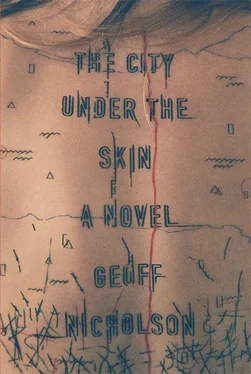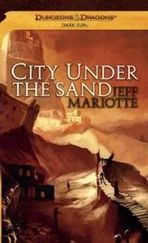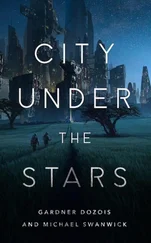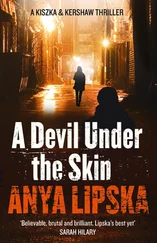Brandt’s exoticism was conspicuous but oddly nonspecific. His voice, when he acknowledged the introduction, seemed to be conducting its own world tour of accents. He was an older man trying to look young. The clothes were all black but featured asymmetrical angles and various fabrics that showed different degrees of luster: velvet, brocade, leather insets. His white hair was spiked and upright, and he wore spectacles that looked like ornate miniature scaffoldings on a long, thin face that would otherwise have appeared bland.
The three TV heads were talking about the future of the city. Mayor Gunderson was giving it her all, being as genial as she could manage, but also comprehensible, talking about the need for the city to get off its butt and press on with new developments. And she had a pet project. The old Telstar Hotel, which all on-screen agreed was a great example of sixties architecture — though Wrobleski had only ever thought of it as that closed-down dump that used to have a revolving restaurant — was now about to be included on the National Register of Historic Architecture. Gunderson had worked hard for this, become personally identified with the campaign that put the Telstar at the heart of the next phase of renewal. She said she cared deeply, was passionate about the plans. She said she was prepared to put her reputation on the line here. For all that Wrobleski despised and distrusted politicians, he was almost inclined to believe her.
He looked over to the other side of the room, where Akim was meticulously, if unenthusiastically, polishing the glass on a wall full of framed maps. Wrobleski couldn’t trust just anyone with a job like that.
On the TV screen, Brandt was now unleashed. Before long Wrobleski was not so much listening as fighting to stop himself from riddling the screen with bullet holes. He heard Brandt utter formulations about shifting paradigms of urban policy, sustainability, streetscapes, environmental enhancements, social inclusiveness, synergy, metropolitan hegemony.
It was only after this had gone on longer than any sane human being could possibly tolerate that the interviewer decided it was time to bring things to a close. She talked directly, and a little too brightly, to the camera for a few moments, and as she spoke, Meg Gunderson (off microphone, but by no means off camera) looked across at Brandt and mouthed the words “You twat.”
“You know,” said Wrobleski to Akim, “the more I see of this woman Gunderson, the less and less I feel like killing her.”
The “sleazy watering hole” was named the Grid. Originally it had been a minor outpost of the telecommunications industry, a squat bunker of a building that housed an arcane and obsolete form of telephone exchange. Now it had been “repurposed” into an inky, angular, high-ceilinged bar, with tight pools of blue and purple light, and miscellaneous chunks of antique electronic equipment half-visible in dark recesses. It was the kind of place that casual, uncommitted drinkers would peer into and immediately realize, rightly, wasn’t for them. There were TV screens above the bar, but no sports had ever been shown on them. The management preferred to screen classic noir and European avant-garde masterpieces, played in slow motion with the sound off.
In the corner, on a tiny raised stage, an extravagantly muscled, hairless man was playing an electronic keyboard. He looked as if he might have been a biker, maybe a laid-off steelworker, maybe a gay bodybuilder. His repertoire heavily favored Satie, Philip Glass, and Stockhausen. He called himself Sam, though nobody thought that was his real name, and in any case, few people had ever said to him, “Play it again.” He nodded to Zak and to Marilyn, though it was a general rather than a specific greeting.
“That’s Sam,” said Zak. “They say he used to be a cop. Whether a good cop or a bad cop, I’m not sure. One of those ‘profiler’ guys, I think.”
Otherwise the crowd was a mix of hipster, nerd, and borderline-criminal element. The woman behind the zinc-topped bar looked like a ruined Bettie Page, something both reinforced and contradicted by a tattoo of Bettie Page on her forearm. Zak and Marilyn took up places at the bar and ordered drinks from the “special” cocktail menu. Something celebratory seemed in order. Nothing quite brings people together like being beaten up at the same time, in the same place, by the same guy. The drinks came, in elegant, conical cobalt-blue glasses, though the bases were severely chipped.
“This is where you come for kicks?” Marilyn said.
“One of the places.”
“And what else do you do for kicks, Zak?”
“Oh, you know … I read, I watch movies, I walk. Actually what I like best is urban exploration.”
“Yes?”
She didn’t seem as impressed by that as she had been by his knowledge of maps. He tried to explain.
“Urban exploration: investigating the city, creative trespass, going where I’m not supposed to, getting into abandoned structures, factories, closed-down hospitals, derelict power stations. You know?”
“So you spend all your workdays dealing in representations of places, and you spend your free time exploring actual places.”
“Does that sound weird?”
“Not to me. What do you think I was doing the other night when I found Utopiates? Walking, looking at the city, taking pictures.”
“A woman after my own heart,” Zak said, and immediately felt like a fool. At least he hadn’t used the word “soulmate.”
Without being asked, the bartender delivered two bags of ice, suitable for the care and treatment of black eyes. Zak remembered why he liked this place so much.
“Yeah,” he continued, “on my days off, I get in the car, go to some disused flour mill or iron foundry or whatever, and you know, just poke around.”
“You have a car? You don’t look like a car owner.”
“How do car owners look? It’s just a company car, a big brown station wagon, good for hauling stock and not much else.”
“But still,” said Marilyn, “it creates possibilities.”
Zak took a moment to consider what these might be.
“You got any tattoos, Zak?” Marilyn asked.
“No.”
“Ever thought about it?”
“Not really,” said Zak. “I wouldn’t know what to get. It’s a big commitment. Not that I’m afraid of commitment.”
“How about a tattooed map?” Marilyn suggested.
“Even bigger problem. Of where?” he said. “Atlantis? Pangæa? The Batcave? And I definitely never thought of having one on my back.”
They suckled on their drinks.
“We got beaten up,” said Marilyn, “just because of something we saw.”
“I don’t think the guy even knew that you saw it until you told him. In any case, I reckon you got beaten up because you hit him with your backpack.”
“It seemed like the right thing to do,” she said. “So I guess we’re not going to call the cops, are we?”
“No,” Zak agreed. “Calling the cops would involve telling them what I saw, and according to the guy who beat me up, I didn’t see anything.”
“But doesn’t that kind of make you want to tell everybody everything?”
“Not really,” said Zak. “And I still don’t know what I saw.”
“Not quite true,” said Marilyn. “We know what you saw, we just don’t know what it means.”
“Now you’re starting to sound like me.”
“And where do you think that poor woman is now?”
They both knew it was an impossible question to answer, but Zak suspected it wasn’t quite a rhetorical one. He felt she was testing him, seeing how his imagination worked.
“Oh, I’m sure she’s living a life of quiet contentment somewhere in the countryside,” he said dryly.
Читать дальше












